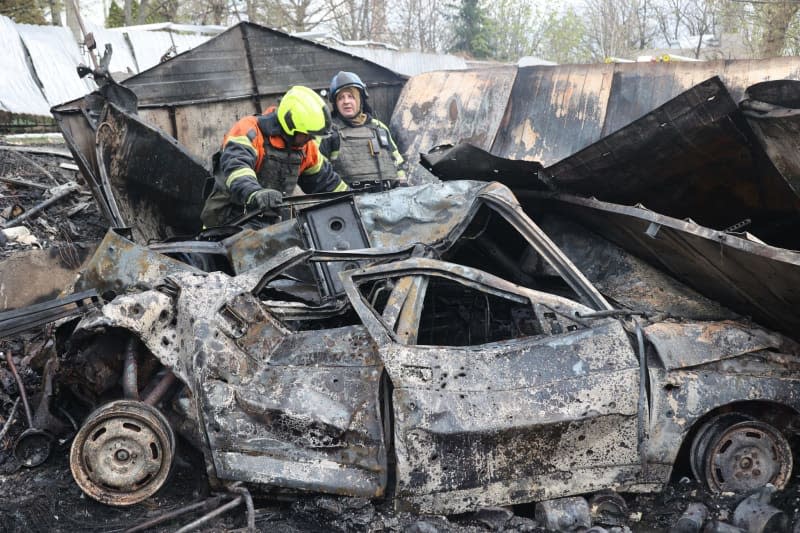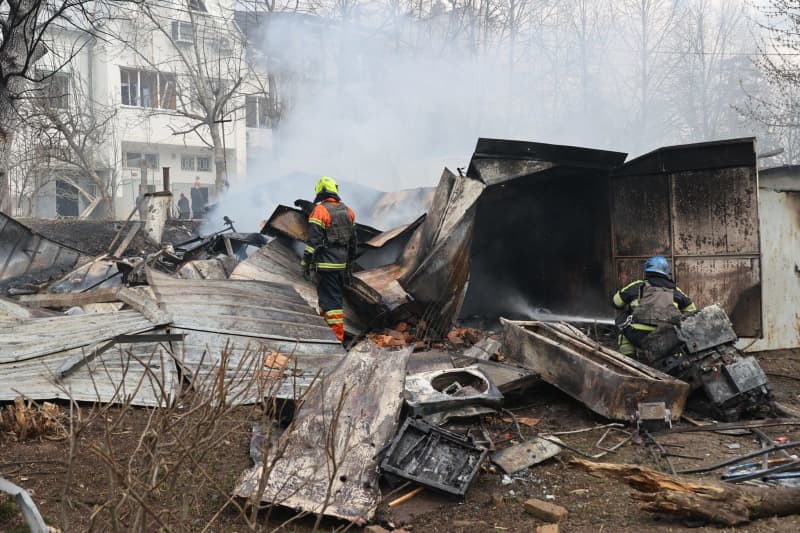Authorities across Ukraine’s regions, from Lviv in the west to Donetsk in the east, reported deaths from Russian drone and missile attacks over the past day. Energy infrastructure was also once again hit.
In Berlin, German Foreign Minister Annalena Baerbock called for urgent international efforts to supply more air defence systems in view of the threat posed by Russia to Kharkiv.
Russian President Vladimir Putin wants to “bomb Kharkiv to the ground,” warned Baerbock. “He wants to destroy, he wants to deliberately destroy.”
“If Russia launches a major offensive there, it would cause immeasurable suffering,” she said.
Ukraine is “maximizing [its] efforts to thwart Russia’s plans against Kharkiv,” President Volodymyr Zelensky said on Monday evening. “Together with our partners, we’re working to bolster air defence.”
Kharkiv, Ukraine’s second-largest city, is home to about 1 million people. Residents have been subjected to near daily attacks in recent weeks, with more injuries reported on Tuesday. Worries are mounting that Russia is using the wave of attacks to lay the groundwork for a summer offensive.
Electricity is only available a few hours a day in the city following a string of devastating strikes on energy infrastructure and residential buildings last month.
Baerbock, speaking at meeting with her Moldovan counterpart, lamented that Germany’s stocks of Patriot air defence systems are “pretty much exhausted.”
She said that a fund was being worked on with Ukraine and European partners to purchase air defence systems from other countries around the world and deliver them quickly.
She hoped that further information could be provided at the meeting of G7 foreign ministers in Italy next week.
Reports of civilian deaths in the past 24 hours highlighted the need for Ukraine to better protect its skies.
Authorities in the central region of Poltava, the northern region of Sumy and the eastern region of Donetsk all announced at least one death in their territory due Russian strikes.
Zaporizhzhya Governor Ivan Fedorov said that the number of civilians killed in his region in strikes on Monday had risen from three to four, with another eight people injured.
A total of 13 villages in the south-eastern Ukrainian region were attacked, he said.
Maksym Kozytskyi, the governor of the Lviv region, said debris from downed drone fell on a “critical infrastructure” site. The Energy Ministry said later that a substation had been impacted and the damage was being assessed.
The ministry said another substation was damaged in Poltava and that the ensuing fire was extinguished.
In Brussels, the European Commission said Germany, Austria, Sweden and the Netherlands are to soon supply Ukraine with 157 power generators in various sizes.
Another drone attack was reported on Tuesday in the area of the Russian-occupied Ukrainian nuclear power plant in Zaporizhzhya.
According to the Russian management of the plant, a training centre next to the power station was hit.
The reported explosion is consistent with observations by experts from the International Atomic Energy Agency (IAEA) who are stationed on site, IAEA chief Rafael Grossi posted on X, formerly Twitter.
He said there was no “direct threat to nuclear safety” but called the situation “extremely serious.”
On Sunday, the plant was attacked by drones in three places. According to an IAEA report, no serious damage was caused. Nevertheless, the Vienna-based agency categorized the attack as a “serious incident” that had endangered the radiation shielding of a reactor.
The IAEA did not say from which side the nuclear power plant was attacked, but it reported that “Russian troops engaged what appeared to be an approaching drone” on Sunday.
Meanwhile, the Ukrainian public prosecutor’s office said it aware of 54 cases in which Russian soldiers are alleged to have shot Ukrainian prisoners of war, stretching back to the early days of the war in March 2022.
A total of 27 criminal proceedings have been initiated, the head of the department responsible for war crimes at the public prosecutor’s office, Yurii Bielousov, wrote on Telegram on Tuesday.
The most recent case is based on a video from the village of Krynky in the Kherson region that became public on Sunday.
The United Nations has received reports of 12 incidents in which at least 32 Ukrainian prisoners of war were shot dead between the beginning of December last year and the end of February alone. The UN observers were able to verify three cases.
In 2022 and early 2023, however, the shooting of 25 Russian prisoners of war by Ukrainian soldiers was also documented.

